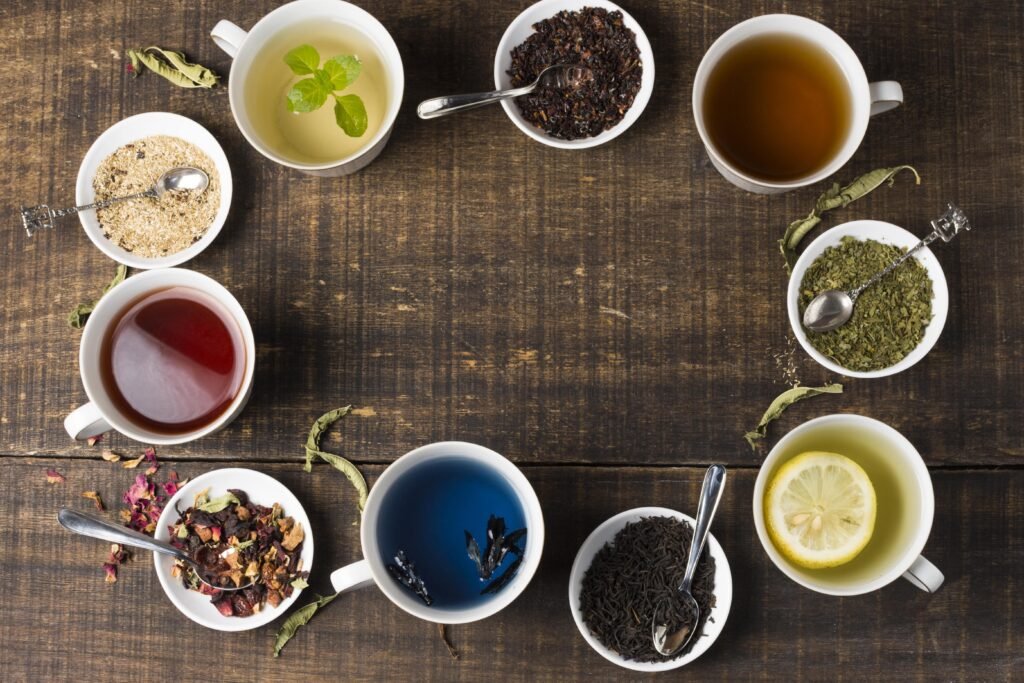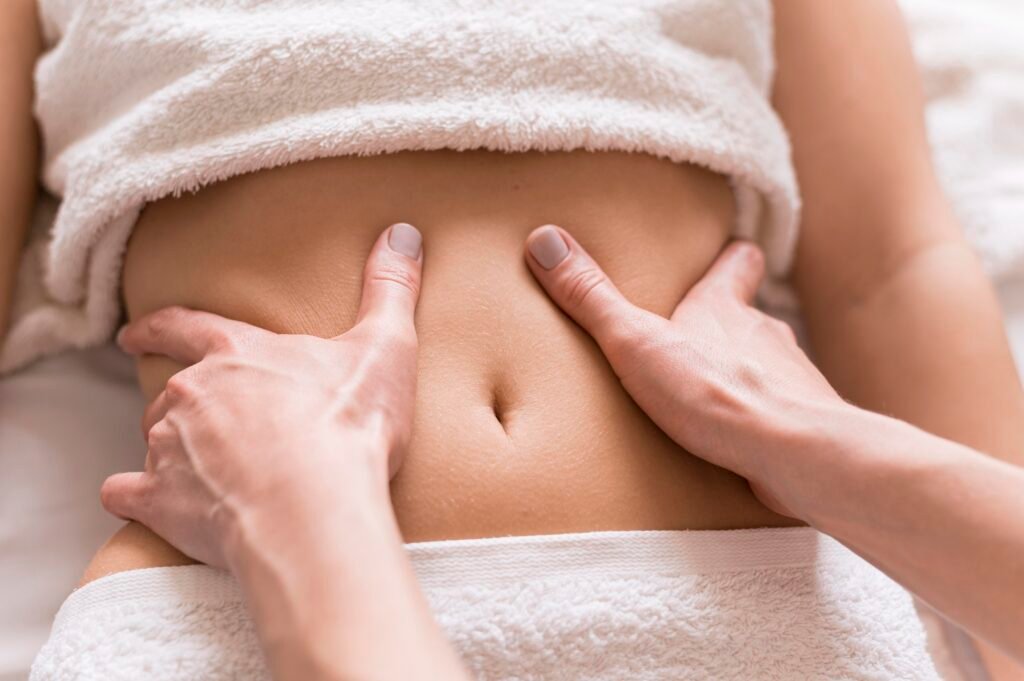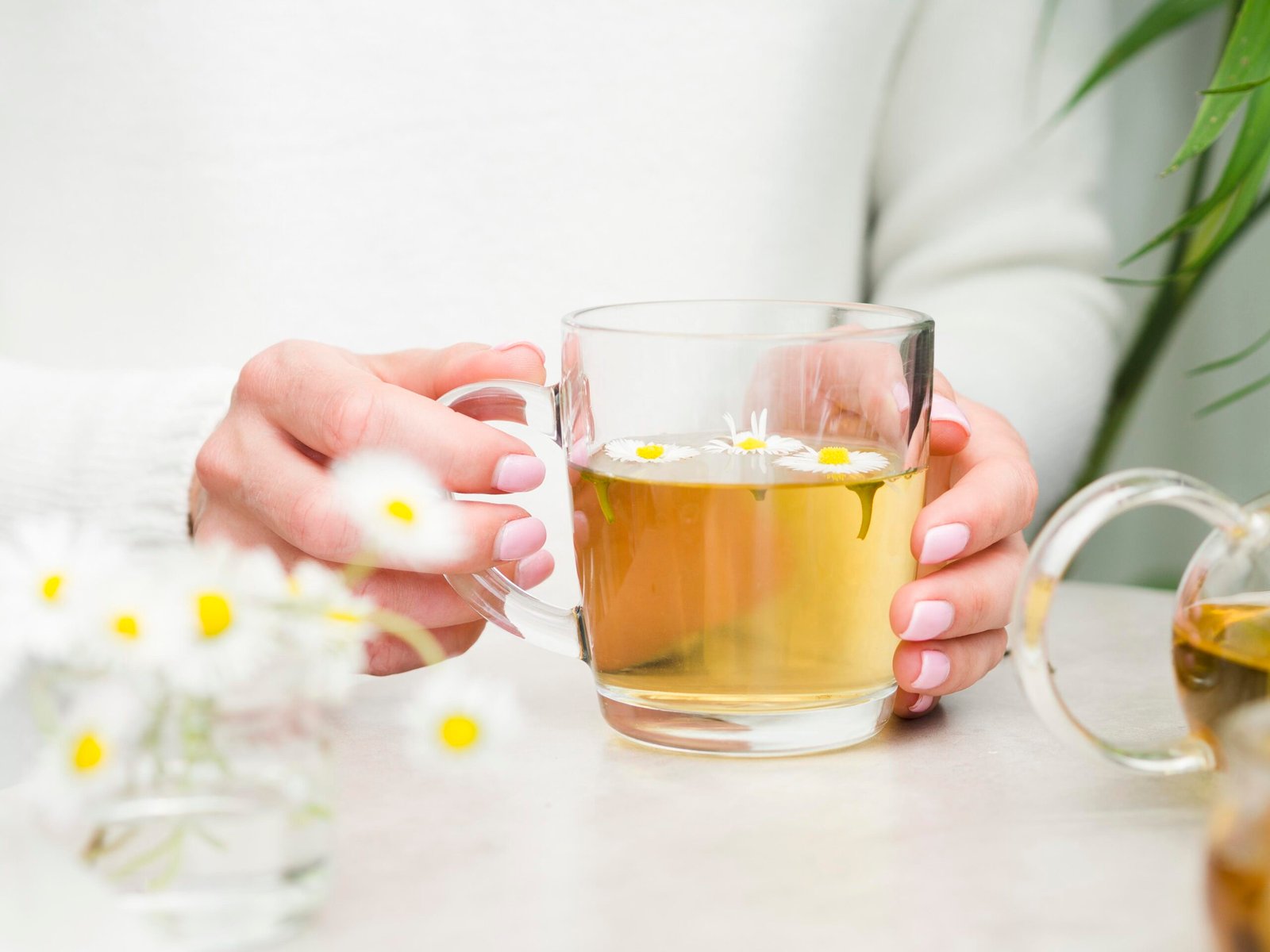Let’s Get Real: Beat Bloating Naturally, One Sip at a Time
Bloating hits us all — the tight jeans, the sluggish gut, the awkward pressure that makes you want to lie down and cancel your day. I’ve been there, more times than I’d like to admit. But I found my fix: a simple, soothing cup of herbal teas. No gimmicks, no quick fixes — just real relief from nature’s best leaves.
Inside this guide, you’ll find the best tea for bloating, I swear by, exactly how to brew them, and smart habits to keep the bloat at bay. Ready to feel lighter, more comfortable, and in control of your belly again? Grab your mug — let’s do this together.
Whether you’re tired of feeling puffy after lunch or you’re on a quest for better gut health, you’re in the right place.
Table of Contents
Why Do We Even Get Bloated?

Let’s get real for a second — bloating happens to everyone. Some days, it’s just a food baby after a big meal. Other times, it’s stress, hormones, or just something not sitting right in the gut.
When food isn’t digested properly, it can ferment in the stomach and intestines. This causes excess gas, discomfort, and that tight feeling we all hate.
The good news? There are gentle, natural ways to calm your belly — and tea is one of my absolute favorites.
How Can Tea Help With Bloating?
Sipping warm herbal teas does more than just relax the mind. Many herbs have natural properties that help calm the digestive system, reduce gas, and ease cramps.
A warm cup of tea can stimulate digestion, relax the muscles in the gut, and help food move through more smoothly. It’s one of the easiest natural remedies for bloating out there.
The ritual of making tea is calming too. Taking a moment to breathe, slow down, and sip mindfully can do wonders for digestion.
Best Herbal Teas for Digestion and Bloating Relief

Let’s break down some of my personal go-to best teas for bloating and speeds up digestion. These aren’t just old wives’ tales — they’re backed by centuries of use and, in many cases, science too.
1. Peppermint Tea: The Classic Tummy Soother
Peppermint tea is probably the most famous soothing tea for bloating and gas. It contains menthol, which relaxes the muscles of the digestive tract.
When your gut muscles relax, trapped gas can pass more easily. This means less pressure, less pain, and less bloat.
I like to brew a cup of pure peppermint leaves about 30 minutes after a meal if I feel gassy or heavy.
Tip: If you have acid reflux, peppermint might not be the best choice — it can relax the valve that keeps stomach acid down.
2. Ginger Tea: Warm, Spicy, and Effective
Ginger isn’t just for nausea. It’s one of the best herbal teas for digestion overall.
Ginger tea helps speed up stomach emptying. It also has anti-inflammatory properties that can calm an irritated gut.
I love to grate fresh ginger into hot water with a squeeze of lemon. It’s a great detox tea for stomach bloating, especially in the colder months.
3. Chamomile Tea: Gentle, Calming, and Gut-Friendly

Chamomile isn’t just for sleep. It’s a mild antispasmodic, which means it can help relax the gut and reduce cramping.
Chamomile is great if your bloating is stress-related. A warm mug before bed is one of my favorite natural remedies for bloating and restless nights.
Bonus: It can also help calm mild inflammation in the gut lining.
4. Fennel Tea: An Underrated Star for Gas Relief
If you struggle with trapped gas and uncomfortable pressure, fennel is your friend.
Fennel seeds have been used for centuries as a digestive aid. They help relax the muscles in the digestive tract and support the release of gas.
A cup of fennel tea after a meal can make a huge difference. Sometimes I even chew fennel seeds if I don’t have time to brew tea.
5. Dandelion Tea: A Gentle Detox for Water Bloat
Not all bloating is gas-related. Sometimes, it’s water retention.
Dandelion tea is a natural diuretic. It can help your body get rid of excess water and salt.
It also supports liver function, which plays a big role in digestion and detoxification.
If you feel puffy and heavy all over, not just in your belly, dandelion might help.
6. Green Tea: Light and Detoxifying
Green tea is light, refreshing, and full of antioxidants.
While not as strong as peppermint or ginger for bloating, it does help digestion and can reduce mild water retention.
Many people love green tea as a gentle daily detox tea for stomach bloating. Just don’t overdo it if you’re sensitive to caffeine.
7. Lemon Balm Tea: For Stress and Digestive Cramps
Lemon balm is a calming herb that can ease stress-related digestive issues.
If your bloating is tied to nerves or anxiety, this soothing tea for gas and cramps is worth trying.
It has a mild, lemony taste that’s lovely before bedtime.
My Favorite Homemade Anti-Bloating Tea Blend
Sometimes, I like to mix my own herbal bloating relief blend at home.
Here’s my personal recipe:
- 1 tsp dried peppermint leaves
- 1 tsp dried chamomile flowers
- ½ tsp crushed fennel seeds
- A slice of fresh ginger
- Hot water
Steep for about 5-10 minutes, strain, and sip slowly. It’s gentle, comforting, and hits multiple digestive points at once.
How to Get Rid of Bloating Naturally: A Few More Tips
When bloating strikes, reaching for a warm cup of herbal tea is a smart first step — but there’s a lot more you can do to keep your gut happy and gas-free.
Below are some simple, practical lifestyle tweaks and natural remedies for bloating that really work. Try adding a few of these to your daily routine for long-term bloating relief.
1. Eat Smaller Meals, More Often
Large meals can overload your digestive system and make you feel sluggish and swollen.
Instead of three big meals, try eating smaller portions spread throughout the day. This can help your stomach break down food more efficiently and reduce gas buildup.
2. Slow Down and Chew Well

One of the easiest ways to get rid of bloating naturally is to simply slow down when you eat.
Chewing your food thoroughly gives your digestive enzymes more surface area to work with. It also means you’re less likely to swallow excess air, which is a sneaky cause of bloating and burping.
Put your fork down between bites, breathe, and actually taste your food. Your belly will thank you.
3. Cut Back on Fizzy Drinks
Carbonated drinks — like soda, sparkling water, or beer — can fill your gut with bubbles that expand inside you.
If you struggle with bloating, limit fizzy drinks and replace them with still water, herbal infusions for gut health, or warm anti-bloating drinks like ginger tea.
4. Watch Out for Trigger Foods
Everyone’s gut is a little different. For some, dairy is the culprit. For others, it’s beans, cruciferous veggies like broccoli, or artificial sweeteners like sorbitol.
Try keeping a simple food diary for a week. Jot down what you eat and when you feel bloated. You might spot a pattern you didn’t notice before.
Once you know your triggers, you can swap them for gentler options.
5. Stay Hydrated — but Smartly
Hydration is key for good digestion. Water helps keep things moving, preventing constipation — another sneaky cause of bloating.
Aim for at least 6-8 glasses a day. Warm water or detox tea for stomach bloating is even better than ice-cold drinks, which can slow digestion for some people.
6. Move Your Body
Gentle movement is a natural remedy for bloating that costs nothing and works fast.
A short walk after eating can help stimulate digestion and move trapped gas through your intestines.
If you can’t go for a walk, try simple stretches or gentle yoga poses like child’s pose, seated twist, or lying on your back and hugging your knees to your chest.
7. Try Belly Massage

A gentle belly massage can work wonders when gas is stuck.
Use your fingertips to make small, clockwise circles around your belly button. Follow the natural path of your intestines: up the right side, across the top, down the left.
This can help break up gas pockets and encourage your gut to do its job.
8. Add Gut-Friendly Foods
Fermented foods like yogurt, kefir, sauerkraut, kimchi, and kombucha can help balance the bacteria in your digestive system.
A healthy balance of gut flora means smoother digestion and less bloating over time.
If fermented foods aren’t your thing, you might try a high-quality probiotic supplement — but check with a health professional first.
9. Manage Stress
Did you know stress can literally mess with your digestion?
When you’re tense, your body goes into “fight or flight” mode, slowing digestion and causing bloating.
Simple stress-busting habits — like deep breathing, meditation, sipping a calming herbal tea for bloating, or just taking five quiet minutes for yourself — can help keep your gut calm too.
10. Know When to Get Help
Occasional bloating is normal, but constant bloating isn’t. If your bloating is severe, persistent, or paired with other symptoms like weight loss, severe pain, or changes in your stool, it’s time to see a doctor.
There could be an underlying issue like IBS, food intolerances, or a gut infection that needs more than just tea and lifestyle tweaks.
Small Changes, Big Difference
Combining soothing tea for bloating with mindful eating, gentle movement, and a gut-friendly diet can help you feel lighter and more comfortable every day.
Start with one or two of these tips, see how your body responds, and build from there. Your gut will find its happy place in no time.
When to See a Doctor About Bloating
Most bloating is harmless. But if you have severe pain, sudden swelling, or bloating that won’t go away, talk to your doctor.
Sometimes, chronic bloating can signal food intolerances, gut disorders, or hormonal issues that need more care.
How to Make Tea for Bloating Taste Better
If you’re not used to herbal teas, some can taste a bit “earthy” at first.
Try adding a bit of raw honey, a squeeze of lemon, or a cinnamon stick for extra flavor.
You can also chill your tea and sip it iced during warmer months — it still works just as well
Should You Buy Detox Tea for Stomach Bloating?
You’ll see fancy detox teas everywhere these days. Some are fine, but many are overpriced and full of unnecessary additives.
Personally, I trust simple, single-ingredient herbal infusions more than commercial detox blends.
Always read the label and check for laxatives like senna — these don’t actually help digestion; they just force your body to flush out fluids.
How to Pick the Best Herbal Teas for Digestion
When shopping for a good bloating tea, look for organic herbs with no added flavors or chemicals.
Loose leaf is usually fresher than bagged, but tea bags are super convenient too.
Stick to reputable brands, or better yet, buy from a local herbalist if you can.
Final Thoughts: A Gentle Ritual for a Happy Gut
Bloating happens. But you don’t have to suffer through it. Drinking tea for bloating is a simple, natural way to feel lighter and more comfortable every day. Try these soothing herbal teas and say goodbye to that bloated feeling for good!
A simple cup of warm herbal tea can make a huge difference in how you feel — physically and mentally.
Over the years, I’ve come to love the ritual just as much as the relief. Boiling the kettle, inhaling the steam, taking five minutes to pause — it’s self-care in a mug.
Next time your belly feels tight and uncomfortable, brew yourself a cup. Try peppermint, ginger, fennel, or my homemade blend.
Your gut will thank you — and so will your mind.
Ready to Sip Away the Bloat?
Have you tried herbal teas for bloating relief? Which ones work best for you?
Share your favorites below — I’d love to hear your stories and recipes!
And if you found this guide helpful, pass it on to a friend who might need a little belly love too.
Here’s to happier bellies and a calmer mind — one soothing sip at a time.
Frequently Asked Questions (FAQs)
1. What tea is best for bloating and gas?
Peppermint tea and fennel tea are top choices for relieving bloating and gas fast. They help relax your digestive muscles and let trapped gas pass more easily. Ginger tea is another excellent option if you need something warming and soothing.
2. How long does it take for tea to help with bloating?
Most herbal teas for bloating work within 30 minutes to an hour. Sip slowly while the tea is warm to help your digestive system relax and do its job. For best results, drink it after meals when bloating usually hits.
3. What can I drink at night for bloating?
4. Does green tea reduce bloating?
Yes — green tea can help mild bloating because it’s full of antioxidants and supports digestion. It’s not as strong as peppermint or fennel, but it’s a great daily drink to keep your gut healthy and reduce water retention naturally.
5. Can tea detox my stomach?
Certain herbal infusions, like dandelion or ginger tea, can support your body’s natural detox process by boosting digestion and flushing out excess water. Just be cautious with trendy detox teas — many contain strong laxatives that aren’t needed for everyday bloating relief.
6. Which is better for bloating: hot or cold tea?
Warm tea is usually better for bloating because heat helps relax your digestive muscles and gets things moving. Iced tea can be refreshing too, but when your stomach feels tight, stick with a comforting warm cup.
7. How do I get rid of bloating fast naturally?
8. Is it safe to drink herbal teas daily for bloating?
Yes — most gentle herbal teas like peppermint, ginger, chamomile, or fennel are safe for daily use if you don’t overdo it. Always check with your doctor if you’re pregnant, breastfeeding, or taking medications that might interact with herbs.
9. What foods make bloating worse?
Some common culprits include beans, cabbage, carbonated drinks, dairy, processed foods, and artificial sweeteners. Pay attention to your body and keep a food diary to spot your personal triggers.
10. Can tea help with bloating from periods?
Definitely — bloating during your menstrual cycle is very common. Herbal teas like chamomile, ginger, and peppermint can ease cramps, reduce water retention, and calm bloating naturally. Sip warm tea, rest, and stay hydrated.
11. Does tea for bloating really work?
Yes, tea for bloating can really work when you choose the right herbs. Ingredients like peppermint, ginger, and fennel help relax the digestive muscles, ease gas, and reduce bloating naturally and safely.
12. When should i drink tea for bloating?
It’s best to drink tea for bloating after meals or when you feel discomfort. Sipping herbal tea for bloating can help ease digestion and reduce gas naturally.
